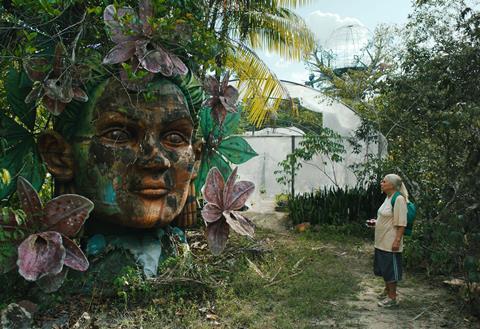Brazilian films are enjoying international recognition thanks to the work of key organisations. They are now aiming to increase the support for co-productions and bring inward investment to the country.

Brazil has entered 2025 with a booming film scene, exemplified by a historic Oscar nomination for Walter Salles’ I’m Still Here and a strong presence in both the Berlinale and the European Film Market (EFM).
Brazilian director Gabriel Mascaro’s The Blue Trail has been selected for Competition, while international promotion and marketing body Cinema do Brasil has brought an industry delegation to Berlin for the 20th year.
“Our two decades of work promoting Brazilian cinema abroad is having an effect now — we have always had good filmmakers, good producers and good films. One thing adds up to the other,’’ says André Sturm, the creator and president of Cinema do Brasil.

Created in 2006, Cinema do Brasil supports Brazilian films’ international distribution, encourages co-productions, and works to develop competitive strategies with which the industry can engage the global industry.
The best picture Academy Award nomination for I’m Still Here is the first for a Brazilian film that is entirely in the Portuguese language. It has also been nominated in the categories for best international film and lead actress (Fernanda Torres).
“The market is seeing the country’s cinema as relevant,” says Sturm. To underline the vitality of Brazilian cinema, the territory’s industry delegation is represented at the Berlinale by three levels of government: federal, state and municipal. The federal body is present through the Brazilian Trade and Investment Promotion Agency (ApexBrasil), the partner of the São Paulo State Audiovisual Industry Association (SIAESP), in the creation and management of Cinema do Brasil.
The state of São Paulo is represented by InvestSP (State Agency for the Promotion of Investments and Competitiveness), while São Paulo Cinema and Audiovisual Company (Spcine) concerns Brazil’s largest city São Paulo. Celebrating its 10th anniversary this year, Spcine is the local company dedicated to the development of cinema, TV, games and new-media sectors.
“When Cinema do Brasil was launched, there was no international public policy for the sector,” recalls Sturm. “Today we have policies aligned at the three levels. It shows the government as a whole understands the importance of the internationalisation of Brazilian cinema.”
More than 50 associated companies are part of the Brazilian delegation at EFM in 2025. Last year saw 38 participating companies generate business valued at approximately $10m at the market (Cinema do Brasil estimates the figure was $48m for the entire year of 2024).
Since its creation, Cinema do Brasil estimates it has helped to generate approximately $407m in business.
Talent roll

The industry professionals attending EFM with the support of Cinema do Brasil include the companies responsible for the 11 Brazilian films selected in different sections of the festival. One of them is Vitrine Filmes, the local distributor of The Blue Trail, the film with which Mascaro is now in the running for the Golden Bear after presenting Divine Love in the Panorama strand in 2019.
Also present is Bionica Filmes, the production company behind Anna Muylaert’s The Best Mother In The World, selected for Berlinale Special, marking the director’s return to the festival after The Second Mother screened in Panorama in 2015. Tangerina Entretenimento will also show two episodes of its series Underage in Generation 14plus.
In addition to the traditional networking cocktail event and the activities dedicated to stimulating business opportunities for its industry professionals, Cinema do Brasil also hosted an EFM panel on the internationalisation of the Brazilian audiovisual sector, which took place on February 14.
The participating speakers — Sturm, São Paulo state secretary for culture, creative economy and industries Marilia Marton, and Spcine president Lyara Oliveira — talked about the ambitious plan to further develop the audiovisual sector in the state of São Paulo. A state film commission is being created to support the formation of municipal commissions in specific cities and promote audiovisual production throughout the state. Until now, support was only available to audiovisual production in the capital of São Paulo.
“We will create a more favourable environment for this interrelation between national and international production to happen,’’ says Marton, adding the state has more than 640 municipalities that can become attractive hubs for filming.
“Any international producer who wants to set a scene in the Amazon does not need to go there. Any part of our Atlantic Forest [extending along the coast of Brazil, including São Paulo state] does the job, with the advantage of offering all the infrastructure nearby, including hotels.”
The state will invest $10.4m (brl$60m) in the audiovisual sector via seven lines of funding, one of which will be focused on international co-production. Several co-production meetings are taking place at EFM with representatives from Germany, Colombia, Uruguay, Poland, UK and Italy.
For Spcine’s Oliveira, it is important that Brazil’s internationalisation initiatives become broader, more diverse and more complex. “Initially, our efforts were focused only on large markets, but we extended them to move away from the European axis and expand our international actions to Africa and Asia,’’ she says.
Between 2020 and 2024, explains Oliveira, Spcine led co-production initiatives with potential partners from the US, France, Germany, Argentina, Japan, South Korea and in the African continent. The aim was to establish connections, benefiting around 50 São Paulo production companies.
Spcine, which was founded in 2015 to promote the audiovisual industry in São Paulo capital, has invested $18.4m (brl$106m) to support 718 projects in the sector to date. Since 2016, when São Paulo Film Commission was created as a department of Spcine, more than 7,600 productions have been filmed in the city, turning it into a destination for national and international projects.
Cinema do Brasil’s Sturm points out that, in the early 2000s, the country made great films that performed well in the local market, but did not travel — with the exception of City Of God (2002), which all agree was an outlier. But not because the films were not good enough.
“Films like Cazuza: Time Doesn’t Stop (2004), Olga (2004) or Lisbela And The Prisoner (2003) would have been selected for major festivals if they had been made 10 years later,” suggests Sturm. “But at that time, we had neither government policies nor initiatives that worked towards the internationalisation of our cinema. Our films were hugely successful in the country — and that was that.”
Now, Brazilian films and filmmakers are regulars at leading festivals. “In the past eight or nine years, on the eve of a big festival, we have no doubt we will be represented in the official selection. The only doubt is, which film,’’ he says with a smile.
Contact: Morris Kachani, executive manager, Cinema do Brasil



























